Thank you to the Whyte Museum of the Canadian Rockies for granting permission to the Park Warden Service Alumni to post this interview on our website.
This Oral History interview was funded in part by a research grant received in 2019 from the Government of Alberta through the Alberta Historical Resources Foundation.
Park Warden Alumni Society of Alberta
Oral History Project Fall 2019
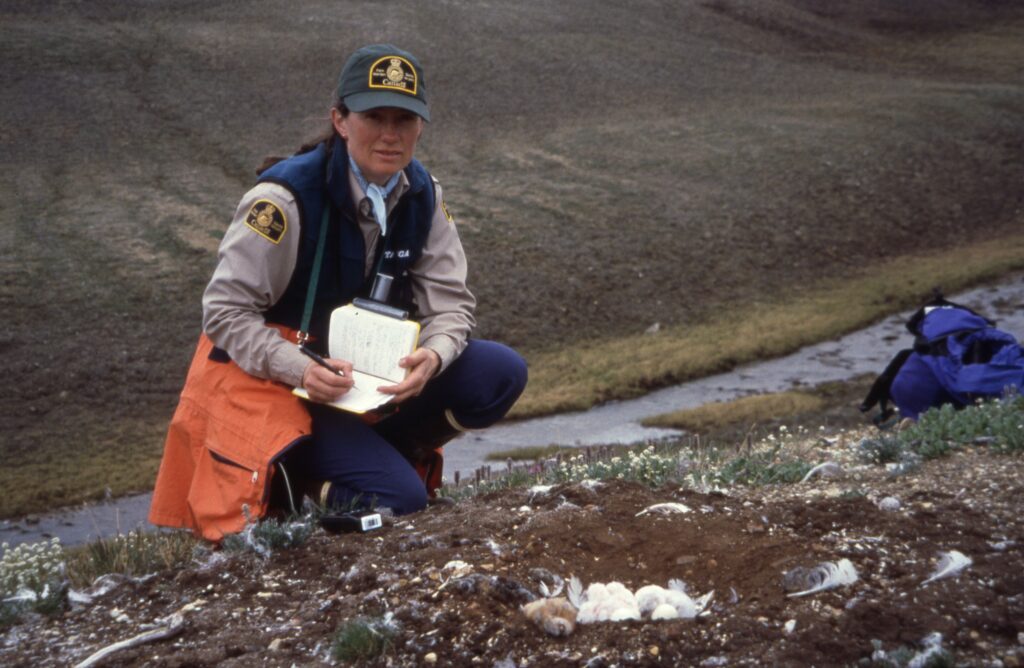
Cyndi on snowy owl nest Aulavik National Park 2000
In Person interview with Cyndi Smith, September 19, 2019@1900
Interviewed by Monique Hunkeler
Place and date of birth? Cyndi was born in 1956, in Drumheller, Alberta
MH: Where did you grow up?
CS: Near a little hamlet called Dorothy, along the Red Deer River about 30 miles downstream of Drumheller. Our family, first my dad and then when he passed away, my second oldest brother, managed a large cattle ranch, 500 head of cattle, 30 Sections of grazing land.
MH: How did you become involved in the Warden Service? Which national park did you start working in?
CS: I worked for federal fisheries for a couple of years, same time as Pete Enderwick, on the West coast at Bella Coola, and I had already known about Parks. When I was about 11 or 12, I got the idea of becoming a Park Naturalist, I must have heard about them from somewhere and so I worked as a park naturalist first. I had applied for a Naturalist position and a Park Warden position at the same time and accepted the Naturalist position in Jasper, a six months seasonal. And after I was there and working, I was offered a Warden position in Waterton for three months and I turned it down back then because I had a 6-month seasonal position. So I did that for about 4 years and then I quit to go travelling in Europe. The next year I worked at the West Gate in Jasper because there was no omnibus competition that year, and I have to admit that it was the most boring job I’ve ever done I think, and then started with the Warden Service in 1986 as a Patrol person in Jasper for a couple of years and then the Warden Service. Back when they still had patrolmen positions. Started working in Jasper as a Warden but I worked in Rocky Mountain House National Historic Site (1980) as a Naturalist first, then Jasper as a Naturalist and then a Warden. Patrolman did the same sort of work as a warden. My first job was backcountry (Tonquin Valley) then mid-country patrolman, looking for fishing infractions at local lakes but as a patrolman didn’t have Law Enforcement powers, just checked but had to call someone in if there was an infraction.
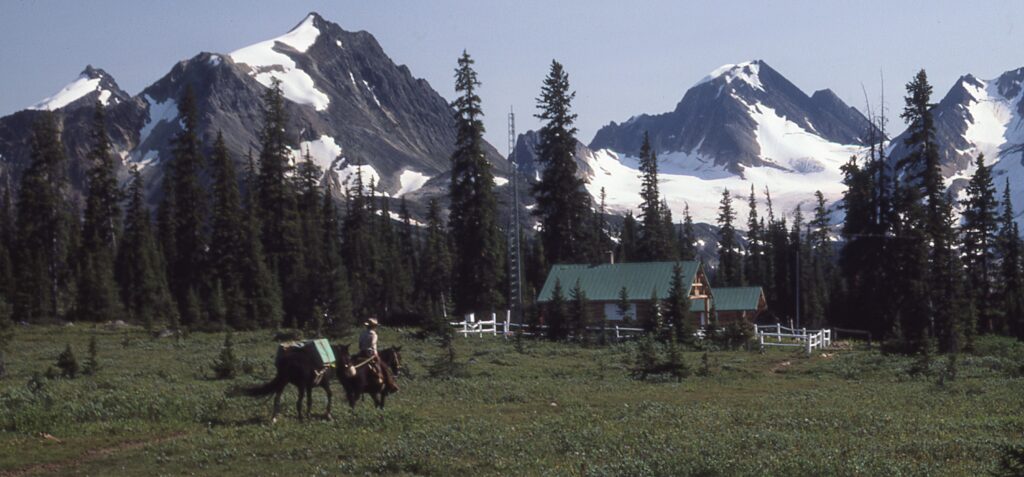
Cyndi on horseback, Tonquin Warden Cabin, Jasper National Park 1986
MH: What made you want to join the Warden Service? 0320:
CS: As I mentioned earlier, I grew up on a cattle ranch and so the chance to work outdoors and with horses. I know there were some women who found it a little hard coming into the Warden Service but I had the leg up as I had a lot more horse experience than Wardens who grew up in cities so it was kind of an automatic pass in a way, having that horse experience made the transition easy. The old timers were always impressed when people could ride.
MH: What different parks did you work in? How did they compare? Do you have a favourite? 430:
CS: As a Park Warden I worked in Jasper, then Kluane National Park and then I went to Lake Louise Field Unit and Banff, then I went up to Aulavik National Park and Banks Island in the Western Arctic and finished in Waterton Lakes National Park. They are all different, each one has something interesting. It was a special experience working in the Arctic, the Inuit people, living in Sachs Harbour. When I finished in Sachs Harbour in October, I worked until March or April as Ecosystem Secretariat Manager, so I went from a GT2 to a PM5 briefly. But the size of Jasper and Banff doing backcountry partrol was a special thing and Kluane was really neat, all that ice. I remember that summer, the Union was forming a local for Kluane and there was a conference in Yellowknife and they were desperate to have representation so I said, “Send me”. At that time, you couldn’t fly directly from Whitehorse to Yellowknife so I went, Whitehorse, Vancouver, Edmonton, Yellowknife and then return. I remember flying over from Vancouver to Edmonton and looking down and realizing, “That’s the Columbia Icefields, that’s really tiny” after having spent time flying over icefields in Kluane. I remember one trip flying to the Mt. Logan cabin by Helicopter and we must have flown 1 1/2 to 2 hours over the icefields. It was mindboggling the scale of it. And then Waterton, when I went there, one of the things I found interesting was I’d pulled out the 1:50,000 topo maps and I go, “Oh, the Park takes up half of a map sheet”. When I worked in Jasper as backcountry patrol, I had about 6 map sheets covering my district… realizing how small Waterton Park was compared to others. One of the things I liked about Waterton was working with colleagues in Glacier National Park, Montana. It was really special to share projects with them, and go back and forth and I still volunteer down there and have friends.
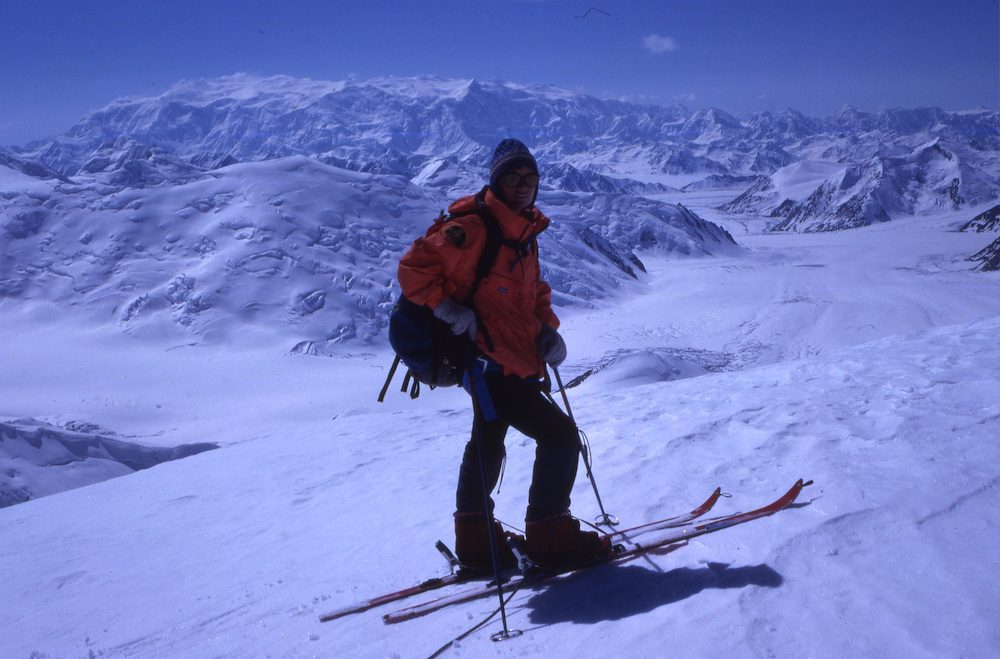
Cyndi Smith with Logan massif behind Kluane NP 1989
0740: Waterton even though it is small is a really special place to me as a biologist, with such diversity. Whether it be Plant or Bird diversity and anything and I also got involved with many different things there. It was a small staff so everyone was involved. I wasn’t doing public safety but I’d run rescue base. They didn’t have a lot of rescues but they had full on Public Safety and they started doing more rescues down in Glacier National Park because they don’t have sling capability. But often for that, the helicopter came out of Canmore so a Banff Specialist would hop on, pick up someone in Waterton and go onto Glacier. With the reorganization in 2012, there was no longer a full time Public Safety Warden for Waterton and it wasn’t a guide level so for some of the rescues they had to bring people in from Banff.
MH: What were some of your main responsibilities over the years? 0920:
CS: The first 11 years were in Operations, Backcountry for five years, Frontcountry Lake Louise and Banff. When I was in the Arctic, a lot of that was backcountry patrol but Aulavik in particular was mentoring Inuvialuit Employees which was one of the reasons for that position. And then for the last number of years in my career I worked as a biologist. My first degree was two years of NAIT Biological Sciences Program and even then, in the late 80s, parks was talking about requiring University degrees for jobs. I didn’t really want to go back to the city to get a degree so I did my undergraduate degree through correspondence with the University of Waterloo. That set me up a number of years later, in the mid-90s when there had been talk for a while about all Wardens being armed. I had nothing against that but I personally didn’t want to carry a firearm. So I thought that maybe if I got a Master’s degree, that might help me get into a biological position so then I went back to Simon Fraser University and got my Masters of Science. That was 1997-1999 and I had a leave of absence from Banff to pursue that. That was when I did my Harlequin Duck research for my thesis.
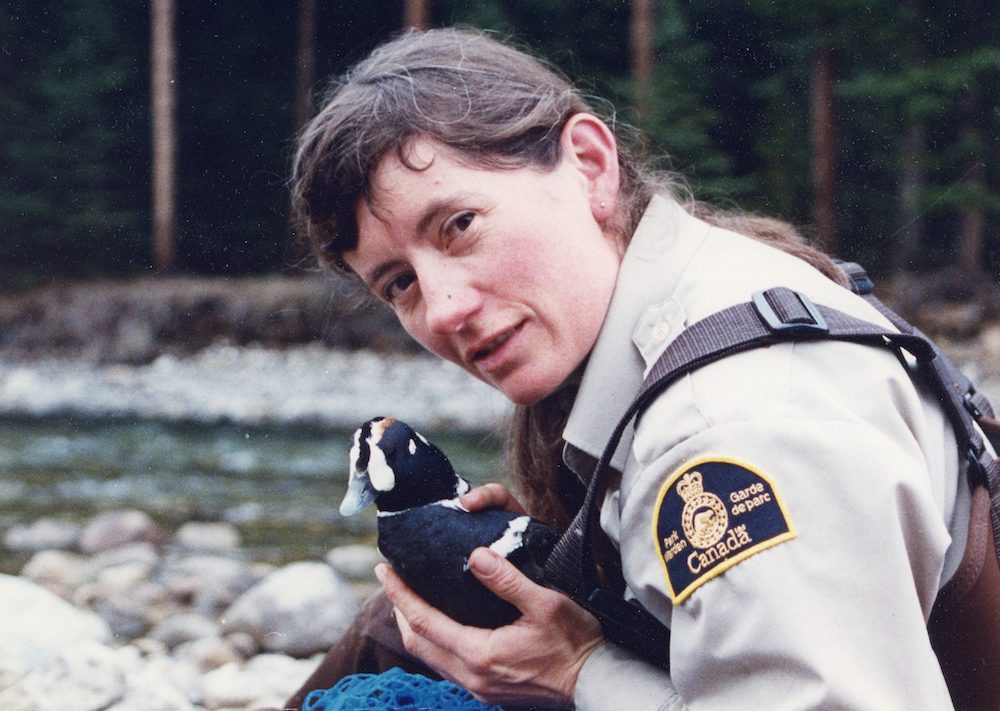
Cyndi with Harlequin Duck, Banff National Park 1995
MH: What did you like / Dislike about being a warden? 1115:
CS: I think mostly being outdoors and for many of those years, the operations, you would come to work everyday and something is different, and you kinda knew what was scheduled for that day but if you were the Duty Warden, it could have been anything and often was. I also liked those years in the backcountry. Growing up on horseback it was just a great experience to be out there. And that is one of the things I miss although in Waterton, I did do a bit of horse work going into the backcountry for research or I would sometimes pack some researchers into cabins if they were going to be working out of a cabin for a few days. I’d take their gear in on a pack horse and they’d hike. And we were using pack horses to take limber pine and whitebark pine seedlings into the backcountry for planting. You had to make up projects to do overnight trips there on a horse cause it’s pretty small.
1235: One of the things earlier on when everyone had Law Enforcement duties, I found that as a returning seasonal who had the authorization to be a Peace Officer, you would be pigeon-holed into doing Law Enforcement because a Term Warden would come along and didn’t have that authority so you couldn’t send them out to do that type of work, so they would get to go out on these fun wildlife projects. I did find that frustrating. There was politics all the time and decisions would come from up above that you didn’t agree with but you couldn’t do anything about, but that’s the same in any job. But overall, I enjoyed my career. I worked 33 or 34 years and the first 20 years were seasonal. After having finished my season there one year I remember telling Chief Park Warden, Bob Haney, that I was allergic to working past the end of October. And interestingly at that time too, there was a number of people I got blow back from who said, “If you don’t want a full time job, you shouldn’t be here.” There were a few of the older Wardens whose thinking was the only reason to be a Seasonal Warden was to become a full time warden. But I said, “Well you should be happy that I can come in and Day 1, grab my uniform and go out to work. I’m coming back refreshed and not worn out and pissed off from problems all winter.” I never had any trouble with Bob Haney, it was just a few other individuals who had that opinion. Considering there weren’t that many full-time jobs and you always needed seasonals, why not have someone who’s happy being a seasonal. I remember Larry Gilmar telling me one time, I think he was in Grade 11 when he got his first job with Parks. He was going back to Grade 12 and he got this letter from Parks offering him a full time job but to do that, he had to quit school. He wished he had saved that letter now when they are asking everyone to have University degrees and they were basically telling him to quit high school for a full time warden job! Times have changed.
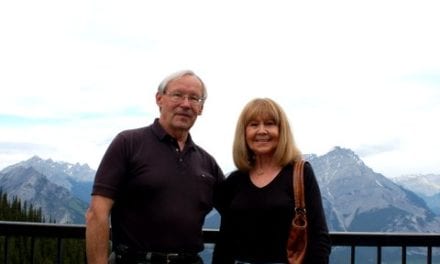

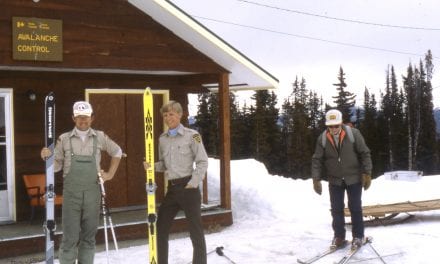
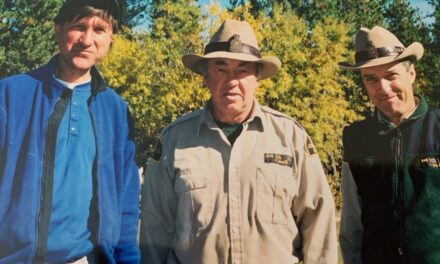
Wow, I just started reading some of these interviews. I knew Cyndi back in the early days in Jasper….great to read this.
I always admired cyndi, i knew of her thru my older sister and as a youngster from my youth thru to my warden days. I followed her career with interest. I even ran into cyndi one time at the same row in the periodical section of the library at sfu during one of my seasonal layoff, I guess our interests paralleled each other to that level. Was proud of her pursuing the masters degree, it was a good fit but im sure it also presented challenges which she met head on.. And I related to many of the stories Cyndi told…mike eder used to speak fondly of Earnie too, and I related as well to her observations of warden culture over the years (for one thing, I can imagine the untold stories of the horse trip with Lisa Paulson). An enjoyable bio to read.